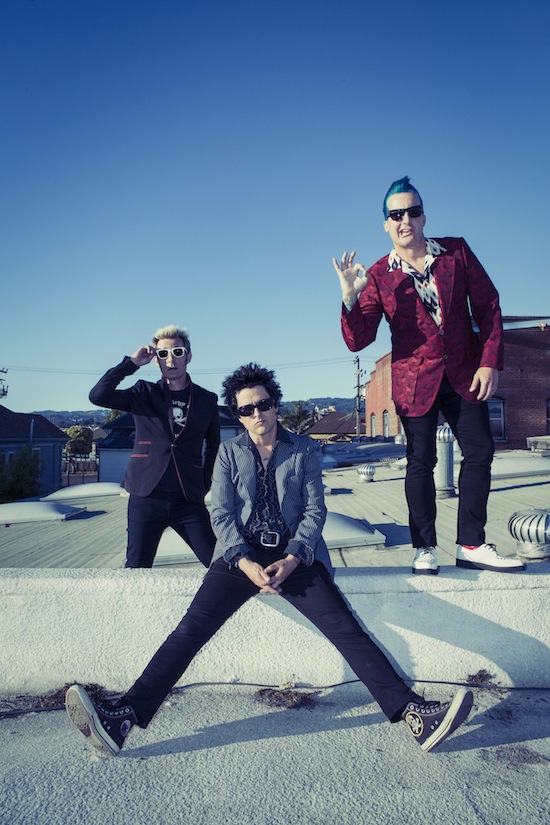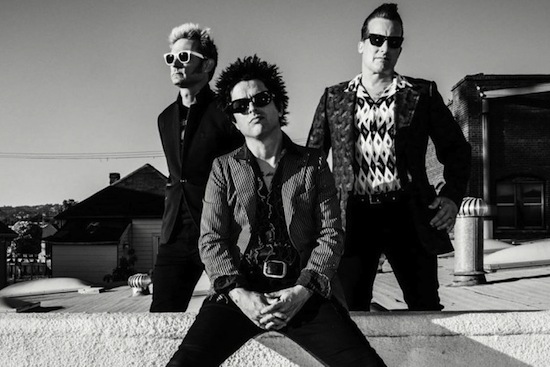Green Day portraits by Frank Maddocks
“It’s really hard to promote a record right now,” says Green Day’s Billie Joe Armstrong, for whose new album the press schedule has been somewhat rudely interrupted. Revolution Radio, their twelfth LP and first since the frontman’s public meltdown and subsequent stint in rehab, has been reasonably well received critically and commercially, and there’s a European arena tour to follow in the New Year, but speaking just 48 hours after Donald Trump’s interminably bleak rise to power there’s a whole lot else to discuss.
That the media have shifted their gaze upon the frontman of America’s largest punk band to something other than the regulation promo platitudes isn’t lost on Warner Music. As I’m led through their lavish Kensington HQ to meet Billie Joe in a cosy recording studio I’m requested to keep our conversation Green Day focused, and to discuss the election only should the musician bring it up himself. There’s a risk, I’m informed, of him "shutting down" should it get too political.
“Well I got out of bed today, that’s a good start,” Armstrong says with a melancholy chuckle as I make introductions minutes later, and extend a handshake. He declines: “I think I need a hug, we all do right now.” He does so. Elephant in the room acknowledged, then.
We’re left to chat as his entourage departs through glass doors left very slightly ajar, and begin on the theme of anxiety that underpins the new record more than any other in Green Day’s canon, and whether this has replaced the energetic anger of old. Within seconds the ‘T’ word rears its bilious head. “I think all our records have captured anxiety,” he says, “but I think after Trump got elected, everything changed. There was a part of the record that’s very personal and uplifting, but now there’s the other [political] part, now that’s on steroids. It feels very real right now.”
There are, as he says, two faces to Revolution Radio, on the one hand a considerable dose of soul-searching and nostalgia for days past in the wake of a “really rough period” in the band’s personal lives, (as well as Armstrong’s time in rehab as a result of prescription drug addiction, bassist Mike Dirnt’s wife and touring guitarist Jason White fought respective cancer battles, both of whom are now in remission). The other side sees the band at their most political; a restlessness which in the wake of the election feels amplified to the extent it overshadows all else.
The latter of these two qualities was intensified too, Armstrong says, by his role as a father to two children. “They’re kids that were raised on Obama and Harry Potter, and now Voldemort’s been elected and Harry Potter’s been killed,” he says. “I think what people want to call ‘millennials’ is a really condescending term, and the way they were depicted in this election wasn’t fair. It was the older generation’s fault that got Trump elected. That’s my kids’ generation and I do feel a lot of anxiety for them.
“Older people are always so condescending,” he continues, “especially in the media when you see these pundits with their perfectly feathered hair and they’re talking about young people like ‘you have to get involved!’ [Young people are] also the product of a George Bush administration and the war in Iraq, and there’s a lot of need for escapism that comes with that. It happens in punk as well as the mainstream, it’s kind of like The Undertones. They’re from Northern Ireland but the last thing they wanted to sing about was [the troubles] because they lived it, every single day. When I got into punk rock it was the late 80s and people were singing about the Regan administration, Watergate and racism, but there was another side to it which was ‘I don’t want to deal with that, I want to create an alternate reality’.”
Green Day, he argues, fall on both sides of the punk spectrum, both confrontation and distraction. “I think sometime we’re unfairly called an apathetic kind of band… We’re all of it, that’s the human experience. There are days when you don’t want to get out of bed and there are days when you want to take it to the streets. That’s what we try to reflect in our songs. We’ve always sung about personal stuff and when we started we weren’t that political, but with American Idiot especially we started becoming more aware.”
It is perhaps no coincidence that Green Day’s political awakening came in 2004 as the Iraq war intensified, a point when things felt darkest in the depths of the Bush administration, and for Armstrong there’s a return of familiar feelings as we steel ourselves for the unknowable horrors of President Trump. “I’ve had a couple of sleepless nights,” he says. “I suddenly felt that feeling of being watched, I’m starting to feel paranoid. That anxiety is coming back.”
Will the next four years, then, be even worse than under Bush? “So far it’s not a good start! The first two things that came out of his mouth were ‘the black president is not an American citizen,’ and the next thing was ‘Mexicans are rapists.’ We’re starting to see the fallout from that already, the faction of Trump voters celebrating by painting swastikas on walls and saying ‘make America white again.’ It’s a monster waking up that’s been dormant for a long time. It scares the living shit out of me.”
Far from ‘shutting down’, as I’d been warned, Armstrong speaks with passion, although tempered by an understandable hint of despair when it comes to the election. Management, I now notice out of the corner of my eye, have been listening through the crack in the door, and begin fixing me uneasy, off-putting stares through the glass as we start discussing the electorate in depth.
The reason they’re worried, perhaps, is that on Election Day Armstrong made potentially sales-damaging headlines in the US after telling NME: “The biggest Trump supporters are uneducated white working-class people. And that’s the problem right there.” He’s happy to elaborate here: “I do feel like a lot of working class people have been ignored, and I feel compassionate for them in that they where they were manipulated using immigrants as a scapegoat. They’ve been trying to get answers and they never have, I think voting for Trump was the biggest revenge therapy I’ve ever seen in my life. But it’s hard. You’re just as racist as the person that’s running if you’re letting racism slide.”
That said, exit polls revealed that Trump’s victory hinged on a majority of white people of all income brackets, in particular the middle classes, voting his way. “I think people vote with their Christianity, and they put their religion first rather than what’s in their best interests,” he says when asked what he makes of it. “I think there’s a bigger population of people like that than we thought was in the electorate, it was a movement and you could feel it. They vote with their emotions, not their intelligence.”
Many on the left failed to even entertain the possibility that a Clinton loss was even possible, Armstrong, he admits, amongst them. “Honestly I don’t think I was prepared,” he says. “There were a couple of times where I got really scared as he came up in the polls but then he’d get knocked down. But I went to bed that night, we were in Paris and voting had just started, and I was like ‘yes, Hillary’s gonna get it’. But then I woke up and I had a fascist president.”

In October, a survey revealed that the majority of voters made their decision based on distrust of the opposition, rather than trust of their own candidate. It’s left many wondering whether Bernie Sanders, who like Trump galvanised a wave of the disaffected, might have fared better. Green Day endorsed the socialist candidate as early as September 2015, but Armstrong is sceptical whether he could have succeeded where Clinton failed. “I don’t know. At this point I don’t think so, because the polls were wrong. The way they talked about the electorate was completely wrong.” Sanders hasn’t ruled out running again in 2020, but it’s ‘too early to tell’ if it’s something the singer could get behind again. “I think there’s a lot of soul searching that the Democratic Party has to do first of all, to figure out where they fucked up. All these people in the DNC need to restructure and right now they need to get rid of all of the fools and all of the idiots that thought this was in the bag.
“The media fucked this up!” he continues, his tone of glum resignation turning, for the first time, to agitated, righteous despair. “They turned this into a reality TV show. All eyes were on Trump the entire time and he became a household name while they ignored the real issues. Trump is a pawn, he’s not a president. Now all three branches of government are Republican, and the Supreme Court, and they have an agenda. All it really has to do with immigrants and gay people is taking away the rights they have, and I feel so bad. I feel horrible. I feel bad for Obama’s legacy, what he represents as a guy that was trying to do the right thing, as a guy that represented peace and grace. Now we have the exact opposite.”
Protests have already begun, of course, not least a petition and social media campaign in Armstrong’s native California to secede from the United States. “It’s mind blowing,” the frontman responds, laughing lest he cry. “This is what it’s come down to. I want unity; I want people to come together. We’re a country of immigrants and we need to get our shit together, we need to have a common purpose and… I dunno… bring some meaning back to this.”
He sighs, and his head drops into his hands. Behind him I spot a PR, now wide-eyed and frantically
waving for my attention as he makes an abrupt ‘cut it’ gesture with his hand across his neck.
Perhaps I’ve finally ‘shut him down’ after all. I abort my next question on the myriad of other protests and acts of civil disobedience sweeping the US, the bona fide riots declared in Portland that morning, for example. It’s time to change the subject.
Unfortunately that subject is the day’s other major news story, Leonard Cohen, whose death had been announced just that morning. Armstrong admits he was never overfamiliar with Cohen’s music, yet feels “It’s the cherry on top of a really depressing year. He was like this perfect angel. All the wrong people are dying, all of these amazing artists. He’s probably looking down on us saying ‘ha, look what you’re stuck with now!’”
With those omnipresent hand signals through the glass demanding we wrap up, there’s a final question that needs to be asked. As America enters what Armstrong has repeatedly described as fascism, what exactly can we do about it? His answer: “All I can say at the moment is just get organised, it’s up to the people to obstruct their agenda. We have to hope the counter reaction [to Trump] will be a lot bigger and a lot more powerful.”
In a somewhat perverse sense of hope, dark times ahead could well be the catalyst for Green Day to spearhead this need for unity. “Growing up and going to shows around [California pop-punk springboard] Gilman Street was the best education I got. Walking through that door the first thing I saw was a sign saying ‘No Sexism, No Racism, No Homophobia’, and I think that’s had an impact on me for the rest of my life,” he recalls. “Now when people come to our shows the main thing is I want them to feel like they’re in a safe space. If you’re gay, straight, white, black, brown, transgender, if there’s one place you feel you can go to it’s a Green Day gig.”
It’s been an emotionally exhausting conversation, not least for Billie Joe, for whom an unending tide of similarly-intentioned press will be streaming through the glass doors for the remainder of the week. PRs re-enter the room as I pack up my things. “Sorry it was so Trump-heavy…” I feel the need to offer in reconciliation.
“Don’t worry man, I was expecting it,” he sighs with a resigned smile and another hug.
Revolution Radio is out now. Green Day tour Europe early next year



